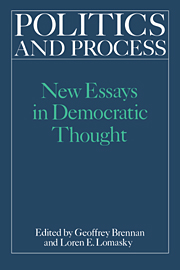Book contents
- Frontmatter
- Contents
- Acknowledgments
- List of contributors
- Introduction
- Chapter 1 The justification of democracy
- Chapter 2 Large numbers, small costs: the uneasy foundations of democratic rule
- Chapter 3 Evaluating the institutions of liberal democracy
- Chapter 4 Democracy: the public choice approach
- Chapter 5 The democratic order and public choice
- Chapter 6 Radical federalism: responsiveness, conflict, and efficiency
- Chapter 7 Contractarian presuppositions and democratic governance
- Chapter 8 In quest of the social contract
- Chapter 9 Rationality and the justification of democracy
- Chapter 10 The morality of democracy and the rule of law
- Index
Chapter 2 - Large numbers, small costs: the uneasy foundations of democratic rule
Published online by Cambridge University Press: 29 September 2009
- Frontmatter
- Contents
- Acknowledgments
- List of contributors
- Introduction
- Chapter 1 The justification of democracy
- Chapter 2 Large numbers, small costs: the uneasy foundations of democratic rule
- Chapter 3 Evaluating the institutions of liberal democracy
- Chapter 4 Democracy: the public choice approach
- Chapter 5 The democratic order and public choice
- Chapter 6 Radical federalism: responsiveness, conflict, and efficiency
- Chapter 7 Contractarian presuppositions and democratic governance
- Chapter 8 In quest of the social contract
- Chapter 9 Rationality and the justification of democracy
- Chapter 10 The morality of democracy and the rule of law
- Index
Summary
Introduction
During the fall of 1973, as Watergate lurched toward its denouement, automobiles along the eastern seaboard began to sprout bumper stickers proclaiming, “Nixon 49 — McGovern 1: Don't Blame Me. I'm From Massachusetts.” This novel plea of innocence raises problems. If McGovern voters from Massachusetts (and the District of Columbia) merit exculpation from the Nixon reelection, who deserves blame? All voters from all other states? Nixon voters from all other states? Massachusetts voters who cast a ballot for Nixon? Does the fact that no one vote could have altered the outcome by the slightest degree and that this fact was known with a high degree of assurance before the election mean that no one bore any responsibility at all for the outcome?
Ascribing praise or blame to individual electors may have little practical importance. (Although, if voters regard themselves as morally responsible for the quality of the vote they cast, moral considerations will weigh in determining how they vote.) What is decidedly nontrivial is the relation between voter responsibility and the justification of democratic governance. If there is something distinctive about rule that stems from democratic processes compared with that which is exercised by a nonelected elite, it may be said that in the former case the enfranchised populace bears direct responsibility for which candidates gain office and somewhat less direct responsibility for policies that are enacted.
- Type
- Chapter
- Information
- Politics and ProcessNew Essays in Democratic Thought, pp. 42 - 59Publisher: Cambridge University PressPrint publication year: 1989
- 9
- Cited by



